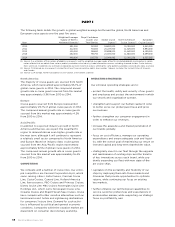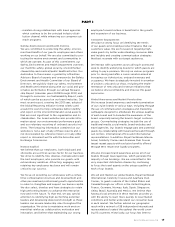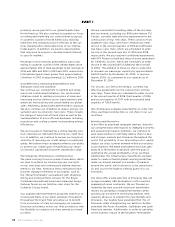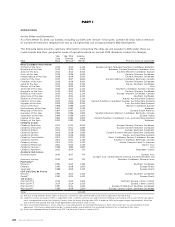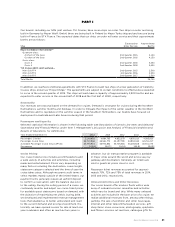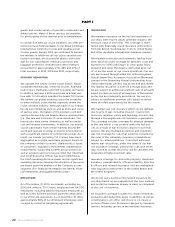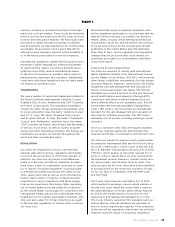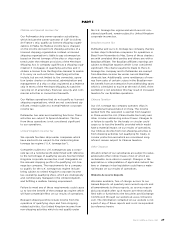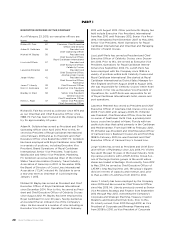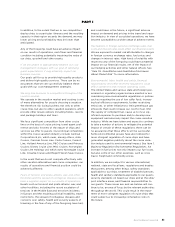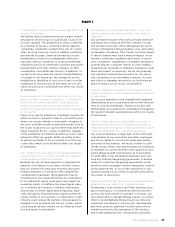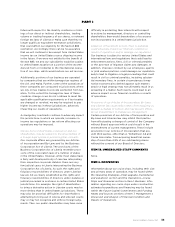Royal Caribbean Cruise Lines 2014 Annual Report Download - page 26
Download and view the complete annual report
Please find page 26 of the 2014 Royal Caribbean Cruise Lines annual report below. You can navigate through the pages in the report by either clicking on the pages listed below, or by using the keyword search tool below to find specific information within the annual report.
Royal Caribbean Cruises Ltd. 25
PART I
Labor Regulations
The International Labour Organization, an agency of
the United Nations that develops worldwide employ-
ment standards, has adopted a new Consolidated
Maritime Labour Convention (the “Convention”) which
became effective in August 2013. The Convention
reflects a broad range of standards and conditions
governing all aspects of crew management for ships
in international commerce, including additional
requirements not previously in effect relating to the
health, safety, repatriation, entitlements and status of
crewmembers and crew recruitment practices. Each
of our ships has received its certification of compli-
ance with the requirements of the Convention. We
have not incurred and do not expect to incur material
costs related to implementation and ongoing compli-
ance with the Convention.
Consumer Financial Responsibility Regulations
We are required to obtain certificates from the United
States Federal Maritime Commission relating to our
ability to satisfy liability in cases of non-performance
of obligations to guests, as well as casualty and per-
sonal injury. As a condition to obtaining the required
certificates, we arrange through our insurers for the
provision of surety for three of our ship-operating
companies. The required surety amount is currently
$22.0 million per operator. However, under amend-
ments approved in February 2013, the required amount
will increase to $30.0 million per operator by April
2015 and will be subject to additional consumer price
index based adjustments thereafter. We do not antici-
pate that compliance with the new rules will have a
material effect on our costs.
We are also required by the United Kingdom, Norway,
Finland, and the Baltics to establish our financial
responsibility for any liability resulting from the
non-performance of our obligations to guests from
these jurisdictions. In the United Kingdom we are cur-
rently required by the Association of British Travel
Agents to provide performance bonds totaling approx-
imately £31.5 million. The Norwegian Travel Guarantee
Fund requires us to maintain performance bonds in
varying amounts during the course of the year to cover
our financial responsibility in Norway, Finland and the
Baltics. These amounts ranged from NOK 33 million
to NOK 87 million during 2014.
Certain other jurisdictions also require that we estab-
lish financial responsibility to our guests resulting
from the non-performance of our obligations; how-
ever, the related amounts do not have a material
effect on our costs.
Regulations Regarding Protection of Disabled Persons
In June 2013, the U.S. Architectural and Transportation
Barriers Compliance Board proposed guidelines for
the construction and alteration of passenger vessels
to ensure that the vessels are readily accessible to and
usable by passengers with disabilities. Once finalized,
these guidelines will be used by the U.S. Department
of Transportation and U.S. Department of Justice to
implement mandatory and enforceable standards for
passenger vessels covered by the Americans with
Disabilities Act. While we believe our vessels have
been designed and outfitted to meet the needs of our
guests with disabilities, we cannot at this time accu-
rately predict whether we will be required to make
material modifications or incur significant additional
expenses given the preliminary status of the proposed
guidelines.
Taxation of the Company
The following is a summary of our principal taxes,
exemptions and special regimes. In addition to or
instead of income taxation, virtually all jurisdictions
where our ships call impose some tax or fee, or both,
based on guest headcount, tonnage or some other
measure.
Our consolidated operations are primarily foreign
corporations engaged in the owning and operating of
passenger cruise ships in international transportation.
United States Income Taxation
The following is a discussion of the application of the
United States federal and state income tax laws to us
and is based on the current provisions of the United
States Internal Revenue Code, Treasury Department
regulations, administrative rulings, court decisions
and the relevant state tax laws, regulations, rulings
and court decisions of the states where we have busi-
ness operations. All of the foregoing is subject to
change, and any such change could affect the accu-
racy of this discussion.
Application of Section 883 of the
Internal Revenue Code
We and Celebrity Cruises Inc. are engaged in a trade
or business in the United States, and many of our
ship-owning subsidiaries, depending upon the itiner-
aries of their ships, receive income from sources
within the United States. Additionally, our United
Kingdom tonnage tax company, owned by us and
Celebrity Cruises Inc., is a ship-operating company
classified as a partnership for United States federal
income tax purposes that may earn United States
source income. Under Section 883 of the Internal
Revenue Code, certain foreign corporations are not
subject to United States federal income or branch
profits tax on United States source income derived
from or incidental to the international operation of a
ship or ships, including income from the leasing of
such ships.



